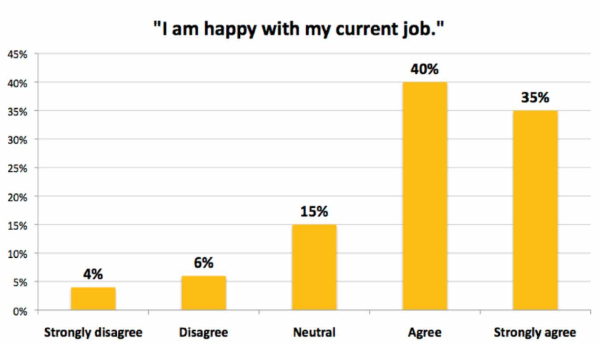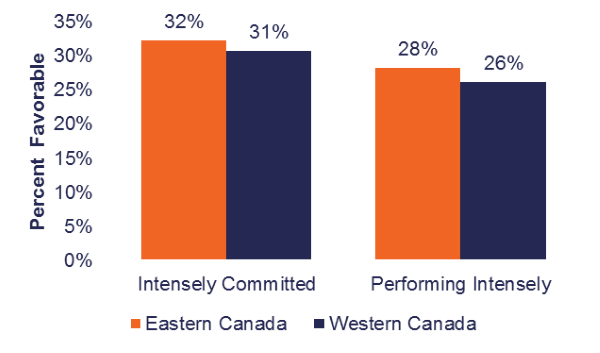Why Do People Leave Their Jobs
At BI WORLDWIDE Canada, we regularly listen to executives express their concerns about losing good employees. It's understandable—turnover is costly and disruptive.
Scroll Down
Employees leave their job for many reasons.
They follow spouses or partners across the country, stay home with children, change careers, and leave to further their education. Those reasons are tough to address by an employer because they involve life events in the employee’s world outside of work.
Most employee engagement survey results released over the last 25 years have focused on the supposed sorry state of employee engagement. Gallup routinely reports that 16 percent of North American employees meet its secret definition of “engaged.” Everyone else (84 percent) is either “not engaged” or “actively disengaged,” groups to whom the company ascribes various levels of sloth, recklessness, or outright hostility toward their employers.
This is consistent with further research by Gallup. In one study of 7,272 participants, it found that 50 percent of employees left their job “to get away from their manager to improve their overall life at some point in their career.”
Is Gallup’s 84 percent disengagement data correct?
Normally we believe numbers from large and respected research organizations. But we have reason to question the accuracy of this number and we are particularly concerned about the impact this message has on the executives of organizations.
Our experience working with Fortune 1,000 companies does not in any way confirm that 84 percent are actively disengaged or not engaged in their work. They are not indifferent and checked-out, nor are they just “killing time”. We agree that there are some people in every organization’s workforce who would not be described as totally “gung-ho.” But declaring that 84 percent of people are simply not engaged or actively disengaged and trying to thwart the organization’s progress simply does not square with our experience.
BI WORLDWIDE’s survey of 1,000 Canadian employees finds no such crisis. While it is true that a sizable minority of employees are on the extreme high end of the range of answers, the majority of workers are not that far behind. Most employees either love their jobs or like them well enough to ably perform them week in and week out. Perhaps most surprising in the face of all the gloomy coverage, the majority of employees are happy at work.

Three-quarters of employees agree with the statement to some degree. These new happiness numbers indicate that people are more connected with their work than commonly assumed. Happiness is hardly an impossible-to-attain aspiration for companies that pay attention to the needs of their employees.
Yet some consultants would dismiss the importance of these results because they consider employee happiness irrelevant, if not counterproductive. Some actively argue against happiness. However, the overlap between those who are happy and those who are engaged is so large that there simply are no appreciable numbers of people who are happy at work and not engaged, or, conversely, engaged and not happy.
We also asked the same number of Canadian employees “what percentage of your full effort are you currently delivering at work?” On average, nearly one-half of Canadian employees report that they put in their full effort. Only three percent of Canadian employees report that they invest only half of their effort or less at work.
The levels of employee engagement can be measured by their level of intensity to perform (i.e. how hard they work for customers and their active interest in improving the way they work) and by the level of commitment to their employer.

While employee’s intensity of performance is equally high in eastern and Western Canada, Eastern Canadians are slightly more committed to their company, on average. More Western Canadians answered neutrally.
The reasons why people leave jobs that don’t involve life events can be addressed by an employer.
People leave bosses, not companies!
This is a statement that almost every single one of us has heard at some point during our careers, in fact, it might even be something that we have said ourselves.
Gallup CEO Jim Clifton summarized in a succinct sentence the bottom line of why your company's employee turnover may be high. He said:
“The single biggest decision you make in your job—bigger than all the rest—is who you name manager. When you name the wrong person manager, nothing fixes that bad decision. Not compensation, not benefits—nothing.”

Horrible bosses, like Bobby Pellit in "Horrible Bosses" fail to inspire and engage their employees. Flickr
Employees who don’t get along with their managers, don’t like them or don’t respect them, will leave a company despite a high salary or great benefits because of their boss. You can’t buy engagement or loyalty. A 2018 study of millennials in the workplace shows that the generational cohort's loyalty to employers is deteriorating. The research, conducted by Deloitte, found that while money can attract talented millennials, it doesn't necessarily retain them.
Low salary
It’s a common assumption pay is a strong motivator and that the more an employee is paid, the happier he/she will be. Neither of those assumptions is really true. Instead, if pay is perceived as fair—comparable to what the person could make elsewhere—the issue of compensation sits quietly in the background.
Perhaps the best advice is to make money a non-issue. Companies should look out for the financial futures of their employees as much as they expect their employees to look out for the financial futures of those firms.
Lack of employee recognition or reward
All employees like to be honoured for their accomplishments. Real-time feedback from management is not only instructive but rewarding to employees. Telling workers their efforts are exemplary and outstanding sends a clear message they are valued and appreciated. When we are recognized for a job well done and in view of our peers, our job satisfaction and engagement levels are significantly increased.
Poor communication
Entrepreneur Richard Branson once said “Communication makes the world go round. It facilitates human connections and allows us to learn, grow, and progress. It's not just about speaking or reading, but understanding what is being said -- and in some cases what is not being said. Communication is the most important skill any leader can possess.”
Managers need to communicate with their people to find out what makes them feel good (for some, it's a raise, for others it's public recognition) and then to reward them for a job well done. Further, employees whose managers hold regular meetings with their employees are almost three times more likely to be engaged than employees with managers who ignore them.
No culture
Cultivating a ‘cool’ culture can take time to successfully permeate through a business. The consensus from conversations BI WORLDWIDE has with human resource leaders is that this needs to start from the top, with senior leaders demonstrating the values and role-modelling the behaviours expected of each employee. Our research demonstrates that this is a journey well worth taking if you want to retain your star performers.
Employee value proposition
To stay competitive, leading employers are getting real about what it takes to attract and retain top talent—beyond pay and benefits. And what they’re leveraging is a thoughtfully crafted, seamlessly executed employee value proposition (EVP) strategy.
Your company’s employee value proposition is the message you send to current and future employees about what it’s like to work for your brand. In other words, it’s kind of a big deal. An EVP gets to the heart of why your business exists and why your employees come to work each day. Sure, part of it is about pay, benefits and security. But if these were the only reasons, your best employees wouldn’t last very long.
A great employee value proposition:
- Attracts people who share your brand’s passions and values
- Inspires employees to do awesome work
- Gives your best employees reasons to stay
At BI WORLDWIDE Canada, we’ll bring your EVP to life. You have a great brand story; it’s just waiting to be told. We’ll make sure it shows up everywhere it needs to be:
- Onboarding programs
- Employee and manager training
- Communication strategies and campaigns
- Employer branding
- Recognition and rewards
- Service anniversary awards
- Employee meetings and events
- Employee surveys and program measurement
Reach out to us and we’ll show your current and future employees what it feels like to love where they work.
The best way to get started is to get in touch.















